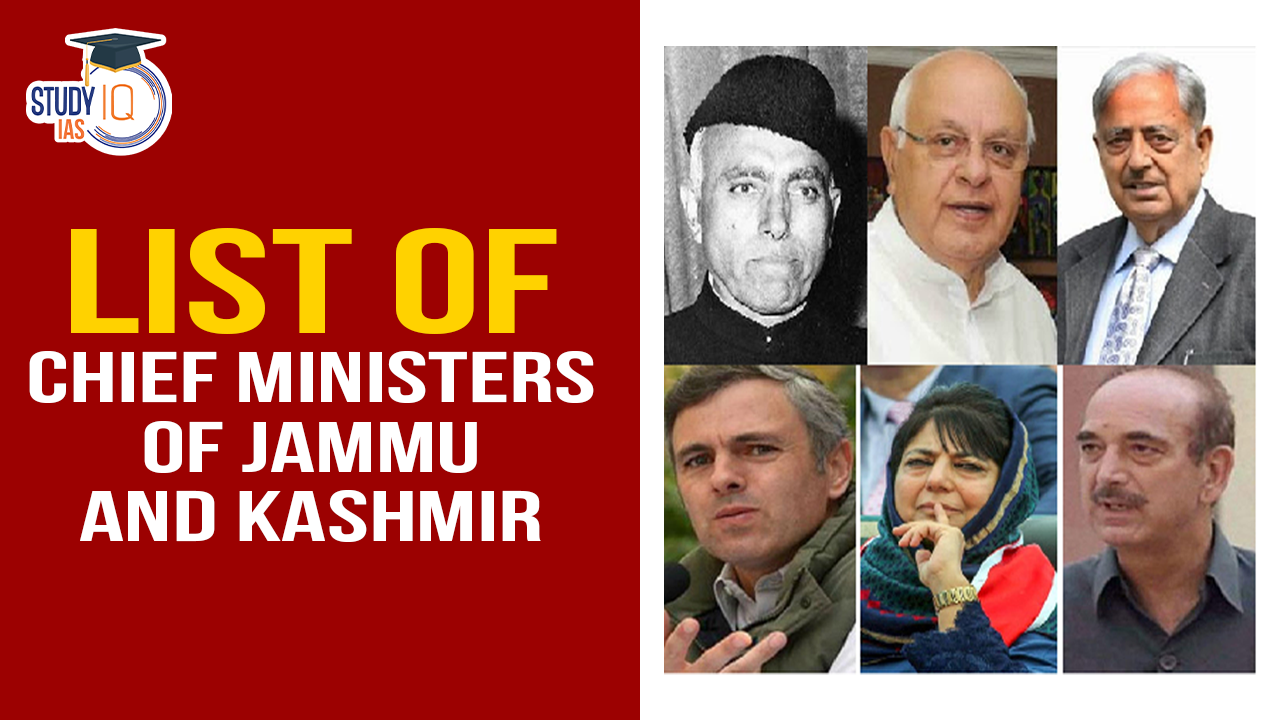Table of Contents
Jammu and Kashmir, a politically significant region in northern India, has seen multiple leadership changes over the years. From 1965, when the region first adopted the title of Chief Minister, until 2019 when it was reorganized into a Union Territory, Jammu and Kashmir witnessed a variety of political shifts. This article provides an in-depth look at the leaders who have governed the region, their contributions, and key political events that shaped Jammu and Kashmir’s history.
Current Chief Ministers of Jammu and Kashmir
As of October 2024, Omar Abdullah is the current Chief Minister of the Union Territory of Jammu and Kashmir. He assumed office on October 8, 2024, marking his second term as Chief Minister. Omar Abdullah, a prominent political figure from the National Conference party, previously served as Chief Minister from 2009 to 2015, completing a full six-year term during that period.
Omar Abdullah comes from a well-known political family in Jammu and Kashmir. His grandfather, Sheikh Mohammad Abdullah, was the first leader of Jammu and Kashmir after it joined India, and his father, Farooq Abdullah, served as Chief Minister of the region three times. Omar Abdullah’s return to the political forefront in 2024 underscores his family’s longstanding influence in the region’s politics.
| Recent Election in Jammu and Kashmir UT |
| The 2024 Jammu and Kashmir elections were the first assembly polls in ten years and the first since Article 370 was removed in August 2019. Voting took place in three phases on September 18, September 25, and October 1 with a total voter of 63.45%. The turnout was 61% in the first phase, 57.3% in the second, and 68.72% in the third. The main parties in this election included the National Conference-Congress Alliance, the People’s Democratic Party, and the Bharatiya Janata Party (BJP). |
List of Chief Ministers of Jammu and Kashmir (1965-2024)
The list below outlines the Chief Ministers of Jammu and Kashmir since 1965, covering key leaders, their terms, and political contributions:
| Name | From | To | Days in Office |
|---|---|---|---|
| Ghulam Mohammed Sadiq | 30 March 1965 | 21 February 1967 | 6 years 257 days |
| Syed Mir Qasim | 12 December 1971 | 25 February 1975 | 3 years 75 days |
| Sheikh Abdullah | 25 February 1975 | 08 September 1982 | 5 years 61 days |
| Farooq Abdullah | 08 September 1982 | 02 July 1984 | 1 year 298 days |
| Ghulam Mohammad Shah | 02 July 1984 | 06 March 1986 | 1 year 247 days |
| Farooq Abdullah | 07 November 1986 | 19 January 1990 | 3 years 73 days |
| Farooq Abdullah | 09 October 1996 | 18 October 2002 | 6 years 9 days |
| Mufti Mohammad Sayeed | 02 November 2002 | 02 November 2005 | 3 years |
| Ghulam Nabi Azad | 02 November 2005 | 11 July 2008 | 2 years 252 days |
| Omar Abdullah | 05 January 2009 | 08 January 2015 | 6 years 3 days |
| Mufti Mohammad Sayeed | 01 March 2015 | 07 January 2016 | 312 days |
| Mehbooba Mufti | 04 April 2016 | 20 June 2018 | 2 years 77 days |
| Omar Abdullah | 08 October 2024 | Incumbent | – |
First Chief Minister of Jammu and Kashmir
Ghulam Mohammed Sadiq was the first Chief Minister of Jammu & Kashmir serving from 30 March 1965 to 21 February 1967. Before that, he was the Prime Minister of the state until 30 March 1965. Mehr Chand Mahajan was the first Prime Minister of Jammu & Kashmir while Sheikh Abdullah was the first elected Prime Minister. Omar Abdullah served as the 11th Chief Minister, and Mehbooba Mufti was the last Chief Minister of Jammu & Kashmir before it became a Union Territory.
Longest Running Chief Minister of Jammu and Kashmir
Dr Farooq Abdullah, president of the National Conference, is the longest-serving Chief Minister of Jammu & Kashmir, with three terms totalling 11 years and 17 days. Dr. Farooq Abdullah served as Chief Minister for three terms:
- First term: September 8, 1982, to July 2, 1984
- Second term: November 7, 1986, to January 19, 1990
- Third term: October 9, 1996, to October 18, 2002
- Sheikh Mohammad Abdullah served a total of 7 years and 90 days over two terms.
- Ghulam Mohammed Sadiq was the first Chief Minister, serving for six years and 257 days.
- Mufti Mohammad Sayeed (PDP) served for about three years and 312 days.
- Omar Abdullah served as Chief Minister for six years and three days from 5 January 2009, to 8 January 2015.
- Ghulam Mohammad Shah had the shortest term, serving from 2 July 1984, to 6 March 1986, for one year and 247 days.
Important Political Transitions
- Governor’s and President’s Rule: Jammu and Kashmir has experienced several instances of Governor’s and President’s rule due to political instability. Notably:
- Governor’s Rule (1986): Following Ghulam Mohammad Shah’s dismissal, the state went under Governor’s Rule from March 1986.
- President’s Rule (1990-1996): Following the rise of militancy and the collapse of state government, the region remained under direct central control for six years.
- Governor’s Rule (2018): The collapse of the BJP-PDP alliance led to another period of Governor’s Rule in 2018, followed by President’s Rule in 2019 until the abrogation of Article 370.
- Revocation of Article 370 (2019): A major turning point in Jammu and Kashmir’s political history was the revocation of its special status on August 5, 2019. This led to the bifurcation of the region into two Union Territories, altering its governance structure significantly.


 Places in News for UPSC 2025 for Prelims...
Places in News for UPSC 2025 for Prelims...
 New Phase of Operation Chakra to Combat ...
New Phase of Operation Chakra to Combat ...
 Soyuz Aircraft: History, Design and Sign...
Soyuz Aircraft: History, Design and Sign...





















